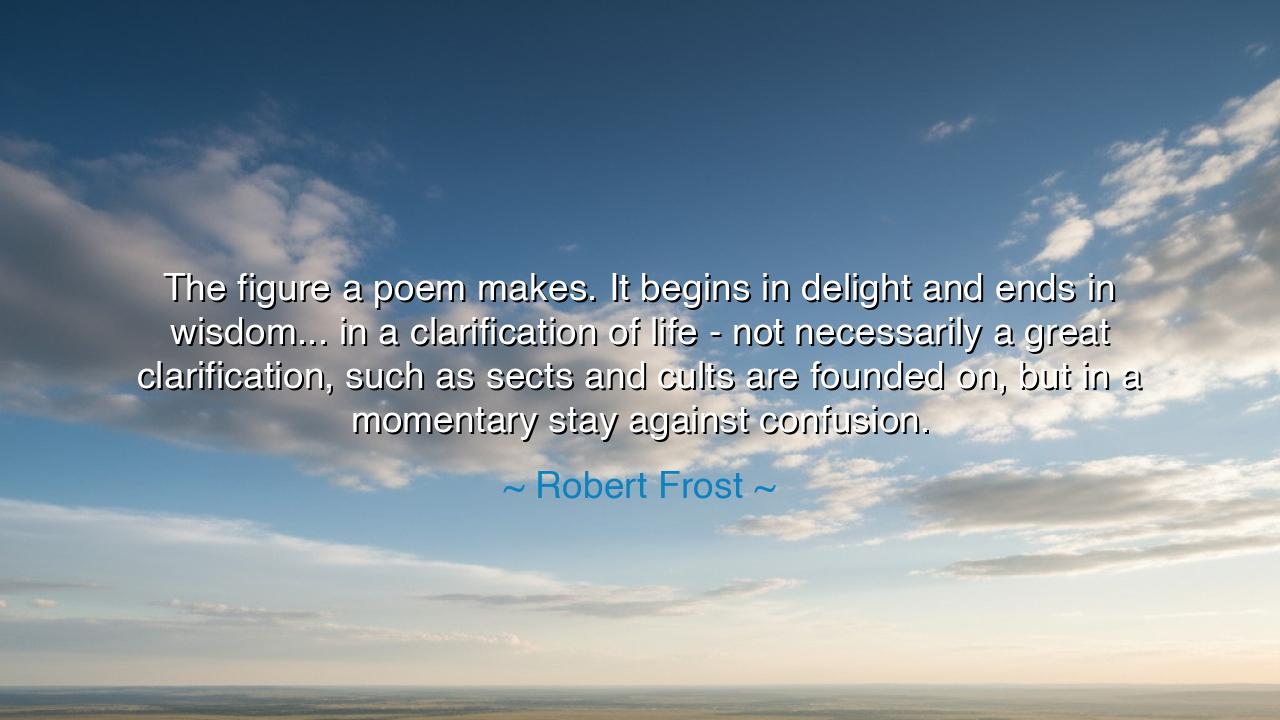
The figure a poem makes. It begins in delight and ends in
The figure a poem makes. It begins in delight and ends in wisdom... in a clarification of life - not necessarily a great clarification, such as sects and cults are founded on, but in a momentary stay against confusion.






When Robert Frost wrote, “The figure a poem makes. It begins in delight and ends in wisdom... in a clarification of life — not necessarily a great clarification, such as sects and cults are founded on, but in a momentary stay against confusion,” he revealed not merely how poems are made, but how truth itself is discovered. These words, born from the meditative stillness of a poet who saw the sacred in the simple, tell us that art — and by extension, all human understanding — begins in wonder and culminates in insight. Frost speaks not of grand revelations that claim to solve all mysteries, but of those fleeting flashes of clarity that pierce the fog of existence — those moments when, if only for an instant, the world feels known.
The origin of this thought lies in Frost’s belief that poetry mirrors life itself: both are journeys from delight to wisdom, from innocence to experience, from beauty to meaning. A poem, like life, does not begin with logic or doctrine but with feeling — with the spark of curiosity, the thrill of perception, the music of a moment that stirs the soul. In writing, the poet pursues that delight until it ripens into understanding. So, too, in living, a person follows joy and struggle until both teach something that endures. Thus, for Frost, the poem is not a construction of intellect, but an act of revelation — a path from the heart’s delight to the mind’s wisdom.
The ancients knew this truth well. Aristotle, in his Poetics, said that poetry is more philosophical than history, for it reveals what could be rather than merely what was. In every age, the poets have been the seekers of that “momentary stay against confusion” — the ones who give shape to chaos through words. When Homer sang of Achilles’ wrath, or Sappho of love’s torment, they did not build systems of belief; they captured glimpses of truth that comforted the restless human spirit. Frost continues this ancient lineage — reminding us that wisdom is not a mountain to be conquered, but a spark to be kindled. The poet’s task, and indeed every soul’s task, is to find clarity within confusion, if only for the brief span of a breath.
Consider the story of Vincent van Gogh, who, though tormented and misunderstood, painted the night sky not as it was, but as it felt — swirling with the currents of his soul. His work did not offer doctrine or definition, but a fleeting clarification — a vision of beauty that transcended despair. In his brushstrokes, chaos became cosmos; pain became light. Like Frost’s “momentary stay,” van Gogh’s art held back the darkness for a time, allowing those who beheld it to glimpse something eternal. Such is the power of creation — to distill meaning from the madness of life, not by explaining it, but by expressing it.
Frost’s words also warn against the arrogance of absolute certainty. He contrasts the poet’s wisdom with the rigid “clarifications” of sects and cults — those who believe they possess the entire truth. The poet, in Frost’s vision, is humbler, wiser. He seeks not final answers, but moments of insight — the kind that illuminate, then fade, leaving behind a gentle peace. The world, he suggests, is too vast for total understanding, but it is rich with small revelations. Each poem, each act of contemplation, offers a temporary refuge — a place where the heart can rest before it must again face the unending questions of existence.
In this way, Frost elevates the ordinary. The poem, the walk in the woods, the quiet conversation, the flash of laughter — all these can become small “stays against confusion.” The greatness lies not in their scale, but in their sincerity. Wisdom, Frost teaches, is not thunder from the heavens; it is the soft light that filters through the leaves after the storm has passed. To live poetically, then, is to live attentively — to let delight guide you toward discovery, to seek meaning not in perfection, but in presence.
So, my listener, take this lesson as both solace and challenge: begin in delight. Let wonder be your teacher. Do not demand from life absolute answers, but cherish its fleeting clarifications. When confusion surrounds you — as it always will — turn to beauty, to truth, to simple acts of creation. Write, sing, build, love. Each of these is a poem written in the fabric of being, each a small defiance against the abyss. For if you can find even one moment of clear understanding, one glimpse of harmony amidst chaos, then you have done what all poets and philosophers have sought since the dawn of time.
In the end, Frost reminds us that both life and poetry are sacred journeys. They do not end in certainty, but in peace. The path from delight to wisdom is the path of the human heart — and though its clarifications may be brief, they are enough to make the world, however briefly, radiant with meaning.






AAdministratorAdministrator
Welcome, honored guests. Please leave a comment, we will respond soon